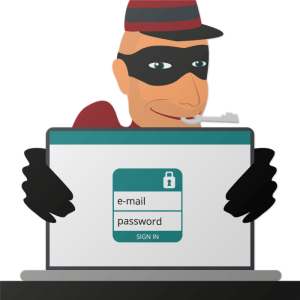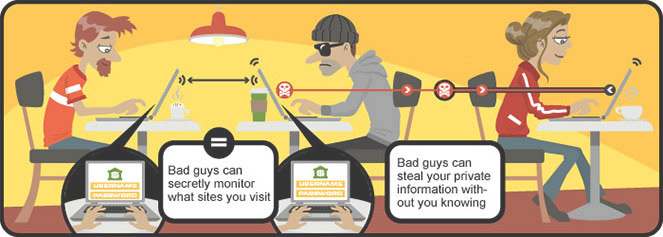Virtual Private Network (VPN) exists to Stay Safe and Secure Your Information while you are connected to the internet, but most of us remember VPN for its ability in masking our computer’s IP address. So, why do you need to mask your IP address? Well, that is because by knowing your IP address, anyone can track your our physical location, ISP, even online activities. In worse cases, hackers can also use your IP address to steal your information (identity theft).
Now, if you had VPN to secure your connection, you may also protect yourself against identity theft. There are plenty of ways hacker can use to get your information, such as usernames, passwords, bank account number, credit card numbers, even your address and telephone number. By accessing the internet, especially through a public Wi-Fi connection, you have given them access to this information. All the hacker needs is the a browser plugin. Whenever you signed to the public Wi-Fi network at a hotel or restaurant, for example, a hacker can easily track your browsing activities and get your sensitive information, such as username and password. This information is plenty enough for them to log into your bank site, for example, to transfer your money to their bank account, changes your social media, and many more.
How VPN Keeps You Safe from Identity Theft
A VPN can protect you against this identity theft by encrypting your data transmissions over the internet, even if the connection you use is practically vulnerable for hacker’s attacks. While you are staying in a hotel, for example, a VPN can help you keep anyone with malicious browser plugin to see your browsing activities and steal your information. The VPN will funnel all information, including, but not limited to your browsing activities and identifying information through a secure, virtual private network where they will be encrypted. Once the encryption process completed, your VPN will send the encrypted information onto the internet. Even if someone tried to perform identity theft against you, the only thing he/she sees will be the encrypted data without any clue to your information, such as your password and username. With an additional security feature most VPN connections have today, you can also know if someone was trying to access your information, as well.
Besides protecting you against identity theft, VPN can also help you fight online frauds, keeping you safe from malwares, adware, and spywares. If in any case, you inadvertently download spyware, malware, adware, or even a virus to your computer, for example, VPN will automatically cancel the download once it detected the malicious program. Additionally, by using VPN, you can also avoid phishing. This application will ensure that you will only visit the real websites, not the similar ones with malicious program coded into them.
 English
English
 German
German Dutch
Dutch Thai
Thai Chinese
Chinese
